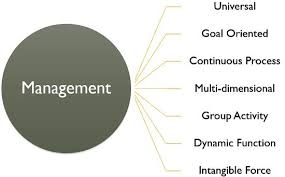Effective Management Strategies for Business Success
The Art of Management
Management is a crucial aspect of any organization, playing a pivotal role in the success and growth of a business. Effective management involves coordinating and overseeing the activities of individuals or teams to achieve specific goals and objectives.
Key Functions of Management
There are four primary functions of management:
- Planning: This involves setting goals, defining strategies, and developing plans to achieve objectives.
- Organizing: Organizing involves arranging resources, tasks, and people to implement the plans effectively.
- Leading: Leading entails motivating, guiding, and supervising employees to work towards common goals.
- Controlling: Controlling involves monitoring performance, evaluating results, and taking corrective actions as needed to ensure success.
The Qualities of a Good Manager
To be an effective manager, one must possess certain key qualities:
- Leadership: A good manager inspires and guides their team towards achieving shared goals.
- Communication: Effective communication is essential for conveying ideas, providing feedback, and resolving conflicts.
- Decision-making: Managers must make sound decisions based on available information and analysis.
- Adaptability: The ability to adapt to changing circumstances and lead through uncertainty is crucial for successful management.
- Problem-solving: Managers should be adept at identifying issues, analyzing root causes, and implementing solutions.
The Importance of Management in Organizations
A well-managed organization benefits from increased efficiency, productivity, employee satisfaction, and overall performance. Effective management fosters a positive work culture that encourages collaboration, innovation, and growth. It also ensures that resources are utilized optimally to achieve strategic objectives.
In conclusion, management is both an art and a science that requires a combination of skills, knowledge, experience, and intuition. By mastering the art of management, organizations can navigate challenges effectively and drive sustainable success in today’s dynamic business environment.
Understanding Management: Key Roles, Definitions, and Core Concepts
- What is the role of management?
- What is your definition of management?
- What are the 5 importance of management?
- What are the 5 meaning of management?
- What are the 4 major of management?
- What is management according meaning?
What is the role of management?
The role of management is multifaceted and crucial to the success of any organization. Management plays a pivotal role in planning, organizing, leading, and controlling various activities within the organization to achieve specific goals and objectives. Managers are responsible for setting strategic direction, allocating resources effectively, motivating employees, making critical decisions, and ensuring that operations run smoothly. Ultimately, the role of management is to drive performance, foster innovation, maintain a positive work environment, and steer the organization towards sustainable growth and success.
What is your definition of management?
Management is the art of coordinating and overseeing the activities of individuals or teams within an organization to achieve specific goals and objectives. It involves planning, organizing, leading, and controlling resources effectively to ensure the successful execution of tasks and projects. A good manager exhibits strong leadership skills, effective communication, sound decision-making abilities, adaptability to change, and proficient problem-solving capabilities. Ultimately, management plays a crucial role in driving organizational success by optimizing resources, fostering a positive work culture, and guiding teams towards achieving desired outcomes.
What are the 5 importance of management?
Understanding the importance of management is crucial for the success of any organization. The five key aspects that highlight the significance of management include planning, organizing, leading, controlling, and coordinating resources effectively to achieve organizational goals. Management plays a vital role in setting clear objectives, allocating resources efficiently, motivating employees, monitoring performance, and adapting to changing circumstances. By embracing these five pillars of management, businesses can enhance productivity, foster innovation, maintain a competitive edge, ensure strategic alignment, and drive overall success in today’s dynamic business landscape.
What are the 5 meaning of management?
The question “What are the 5 meanings of management?” can be interpreted in various ways, depending on the context. In a broad sense, management can refer to the process of planning, organizing, leading, and controlling resources within an organization to achieve specific goals. It can also encompass the act of overseeing or supervising individuals or teams to ensure efficiency and effectiveness in operations. Additionally, management can denote the art of decision-making, problem-solving, and resource allocation in a strategic manner. Furthermore, management may imply the role of leaders or managers in guiding and motivating employees to work towards common objectives. Overall, the concept of management encompasses a range of meanings that highlight its multifaceted nature in driving organizational success.
What are the 4 major of management?
The question “What are the 4 major functions of management?” is a common inquiry in discussions about organizational leadership and structure. The four primary functions of management are planning, organizing, leading, and controlling. Planning involves setting goals and determining the best course of action to achieve them. Organizing focuses on arranging resources and tasks efficiently to implement the plans effectively. Leading entails motivating and guiding employees towards common objectives. Controlling involves monitoring performance, evaluating outcomes, and making necessary adjustments to ensure that goals are met successfully. Understanding these fundamental functions is essential for effective management practices in any organization.
What is management according meaning?
Management, according to its meaning, encompasses the art and science of coordinating and directing resources, people, and processes to achieve organizational goals effectively and efficiently. It involves planning, organizing, leading, and controlling activities within an organization to ensure that objectives are met in a systematic and strategic manner. Management is not just about overseeing tasks but also about inspiring and guiding individuals to work collaboratively towards a common vision. It plays a vital role in shaping the culture, structure, and performance of an organization, making it a fundamental aspect of business success.



